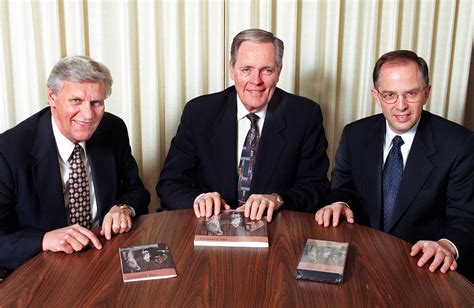A Quote by Hippocrates
Men ought to know that from the brain and from the brain only arise our pleasures, joys, laughter, and jests as well as our sorrows, pains, griefs and tears. ... It is the same thing which makes us mad or delirious, inspires us with dread and fear, whether by night or by day, brings us sleeplessness, inopportune mistakes, aimless anxieties, absent-mindedness and acts that are contrary to habit.
Related Quotes
Men ought to know that from nothing else but the brain come joys, delights, laughter and sports, and sorrows, griefs, despondency, and lamentations. And by this, in an especial manner, we acquire wisdom and knowledge, and see and hear and know what are foul and what are fair, what are bad and what are good, what are sweet and what are unsavory…. And by the same organ we become mad and delirious, and fears and terrors assail us….All these things we endure from the brain when it is not healthy….In these ways I am of the opinion that the brain exercises the greatest power in the man.
Let us, at any rate, give heed to suffer joyfully the crosses that God sends us, because they all, if we are saved, will become for us eternal joys. When infirmities, pains, or any adversities afflict us, let us lift up our eyes to heaven and say, "One day all these pains will have an end, and after them I hope to enjoy God forever."
There's a lot of research that indicates the brain rewards us for multi-tasking by giving us a shot of neurochemicals whenever we start a new task. Our brain rewards us even as our performance in every task degrades. We don't even notice that our performance is bad. We don't care. We feel like masters of the universe because our brain is chemically rewarding us for multi-tasking.
A Morning Prayer The day returns and brings us the petty round of irritating concerns and duties. Help us to play the man; help us to perform them with laughter and kind faces, let cheerfulness abound with industry. Give us to go blithely on our business all this day. Bring us to our resting beds weary and content and undishonored and grant us in the end the gift of sleep.
There is only one day that you and I have to live for, and that's today. There is nothing we can do about yesterday except repent, and there may be no tomorrow. The thing for us to do when we arise from our beds as God gives us a new day, is to take whatever comes to our hands, and do it to the best of our ability.
Into each of our lives come golden moments of adversity. This painful friend breaks our hearts, drops us to our knees, and makes us realize we are nothing without our Lord and Savior. This friend makes us plead all the night long for reassurance and into the next day and sometimes for weeks and months. But, ultimately, just as surely as the day follows the night, as we remain true and faithful, this strange friend, adversity, leads us straight into the outstretched arms of the Savior.
There is a built-in mechanism by which we respond fairly strongly and fairly negatively to somebody who is being negative or to somebody who is simply disagreeing with us, in which case it's a very unhappy position for our brain to be in. Our brain does not want us to be wrong. Because that has very dire consequences in terms of our overall survival.
Put simply, behavioural economics argues that human beings' decision-taking is guided by the evolutionary baggage which we bring with us to the present day. Evolution has made us rational to a point, but not perfectly so. It has given us emotions, for example, which programme us to override our rational brain and act more instinctively.

































